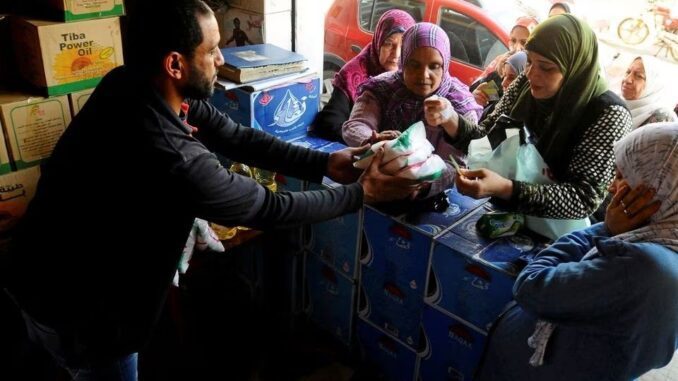
Egypt’s annual core inflation rose to 40.3% in May from 38.6% in April, data from the central bank showed on Sunday, reported Reuters.
Inflation has risen sharply over the last year in Egypt after a series of currency devaluations, a prolonged shortage of foreign currency, and continuing delays in getting imports into the country.
Month on month, it increased to 2.9% in May from 1.7% in April, the data showed.
However, Steve Hanke, the economist and professor of applied economics at the Johns Hopkins University in Baltimore, Maryland, stated, in a tweet, that Egypt occupied the ninth place on this week’s Hanke’s Inflation Roundup, adding that in early June he measured Egypt’s inflation at 74% on an annual basis.
Egypt has devalued its currency by half since March 2022 after the fallout from Russia’s invasion of Ukraine exposed its economic vulnerabilities.
The IMF in December approved a $3 billion Extended Fund Facility loan for Egypt, which will be disbursed over 46 months.
In its December accord with the IMF, Egypt also promised to sell state assets worth billions of dollars over the next four years.
It has made no major sales since the signing, though the central bank has raised its overnight interest rates by 500 basis points.
Disbursements are subject to eight reviews, the first of which was dated March 15, 2023, in an IMF staff report published in December.
The central bank figures come after data from statistics agency CAPMAS showed on Saturday Egypt’s annual urban consumer inflation rate in May accelerated to 32.7% from 30.6% in April, approaching an all-time record and higher than analysts had expected.
Month on month, urban inflation increased to 2.7% from 1.7% in April.
Inflation, IMF austerity measures, and grandiose military plans have edged more Egyptians into poverty.
Two-thirds of the population are struggling with falling living standards as even the once-thriving middle classes hunt for second jobs and eat less
Increasing numbers of Egyptians are desperately hunting for second jobs, cutting back on eating meat and scrambling to find new ways to cope with soaring prices, amid a worsening cost-of-living crisis.
The Egyptian pound has halved against the dollar over the past year, as the financial authorities in Cairo attempt to negotiate a heavily managed devaluation of the currency. People are also struggling to deal with inflation rates of almost 33% and even higher rates of inflation for basic goods.
The cost-of-living crisis in Egypt, which is likely to see an influx of Sudanese refugees in the coming days, has followed years of state-led austerity measures, collapsing a formerly large middle class in the most populous Arab state.
Egypt’s poverty rate hovers close to 30%, according to the most recent government statistics, although the true figure is expected to be higher.
Even as poverty has risen, the Egyptian state has spent heavily on megaprojects such as a sparkling new administrative capital 30 miles east of Cairo, which will boast Africa’s tallest building and a lavish mosque.
“In 2019, the World Bank estimated that 60% of Egyptians lived near or below the poverty line,” said Timothy E Kaldas, of the Tahrir Institute for Middle East Policy, a US-based thinktank.
“There was a very large part of the population above that line, and undoubtedly, many of them have since fallen below it. As inflation continues to grow, more are falling below the poverty line.”
While the Egyptian authorities increased cash assistance to a larger section of the population following Russia’s invasion of Ukraine, it is likely that there are millions still in need.
The International Monetary Fund provided Egypt with a further $3bn (£2.4bn) in financing earlier this year, including conditions demanding that the state provide cash assistance for 20 million people.
“The government isn’t doing enough,” said Kaldas. “If 60% of the population in 2019 were vulnerable, that means there are now tens of millions either in or on the brink of poverty receiving no cash assistance following this crisis, which is woefully inadequate social protection.”
Egypt remains the second largest-debtor to the IMF, now owing almost $13.5bn. The fund’s intervention previously prompted Egypt to enact punishing austerity measures, yet these have not brought the prosperity that was promised.
The latest package also demands sweeping structural reforms that include curbs on Egypt’s huge and opaque military economy. Military financing underpins the expensive government megaprojects that are the key policies of President Abdel-Fattah Al-Sisi, who swept to power in a military coup in 2013.
“The military and the public sector are supposed to be reined in under the IMF program, but we’re seeing the military expand its economic activities at odds with the agreement,” said Kaldas.
For now, Kaldas added, the outlook is decidedly negative for Egyptians, with little relief on the horizon. He said: “Egypt’s standard of living will continue to deteriorate in the coming period, inflation will persist, and the currency likely has not finished its devaluation.
“So far, the Egyptian leadership hasn’t accepted the need to significantly restructure their economic activities in a way that would actually attract investment,” he added.
“So Egyptians will continue to struggle, and more of them will.”



